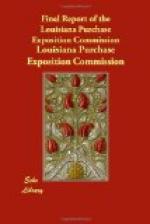in ours at many millions of dollars.
But he would not be surprised if he learned that the federal tie has not been loosened; that the number of States has increased, their wealth, too, the number of their inhabitants, their importance in every respect, and that they consider as more and more sacred the bond which unites them to the older part of the community. Such are the effects of liberty and just laws.
In this triumphal day, amid the shouts of joy, the reports of the guns and ringing of the bells, considering the splendid results, it is only natural that we carry our look backward to the past and have a thought for the lonely pioneers of long ago, who came one by one to this then unknown land, and who tried among incredible difficulties to make it less unknown, to make it more productive and easier to reclaim for you, their distant inheritors. No one, I am sure, will think it amiss that I, a compatriot of theirs and a representative of their country, shall recall at this day their efforts, and express to-day’s gratitude for yesterday’s work. For they were hardy men, those children of distant France; they were plucky, enterprising, and courageous; they led strenuous lives indeed; all qualities for which you ever had a special regard. To say that they did not fear danger is to slander them; they loved it.
Soldiers, missionaries, governors of cities, explorers came year after year from the time of Louis XIV, attracted by the chances or the beauty of the unknown and the opportunity of increasing their country’s dominions, or of becoming famous, or of instructing souls, and of dying, if death was to be met, bravely and honorably. Very French they were, with all the qualities of their race, and something else, perhaps, some of them, than the qualities.
As they went down the great rivers from the regions of the Canadian lakes to the Mexican sea they gave them French names, and the reading of a map of that epoch reminds one of the century of the Sun King. There he is with all his court, figured in lands, cities, lakes, and rivers. Louisiana bears his own name; Lake Pontchartrain the name of his minister for marine; Fort Duquesne, the name of his famous sailor. There were also the rivers Colbert and Seigneley, better known nowadays as Mississippi and Illinois. One of the Great Lakes had been named after the Duke of Orleans; another, the great Conde, the winner of Rocroy; another after his brother, Prince de Conti; but this last inland sea, as indeed most of the others, soon resumed its Indian name, the homely name of Lake Erie, the Lake of the Cat.
Very French they were, those men—this Father Marquette, who, with Joliet, first beheld the magnificent water that washes your walls, the vast existence of which was then unknown, and who explored it down to the country of the Arkansas; this Robert Cavalier Sieur de la Salle, who had,




